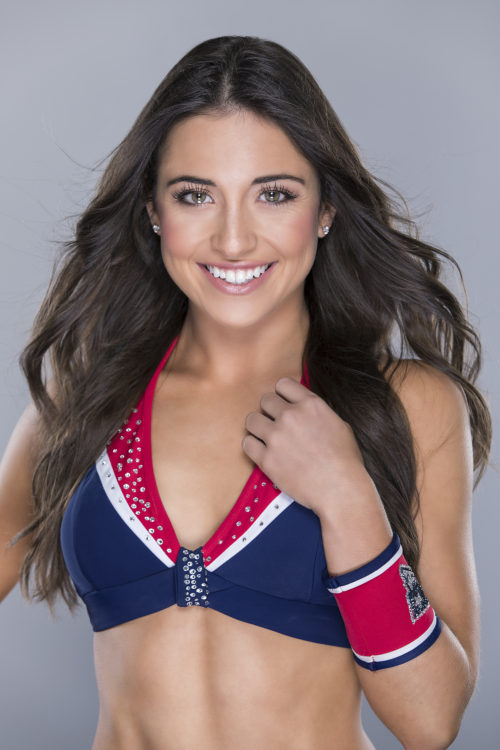
Photo credit: Robert Hare
Science Cheerleader Hilary here! To follow the wonderful interview with New England Patriots Cheerleader Ashley, read on below to hear about her rookie teammate Bella! Bella will graduate next year with a bachelor’s degree in Applied Psychology and Human Development and a minor in Biology!
How did you become interested in science and medicine? I was first turned on to STEM after going through two knee surgeries at Children’s Hospital in Boston. The extensive care and support I received was so life changing, I decided that this was something I could really see myself doing. I had always wanted to make a difference in people’s lives and I experienced first-hand just how much doctors do this.
What does it mean to you to be studying STEM (science, technology, engineering, math)? For me, studying STEM means that I will one day be able to improve the health and well-being of future generations. I have a passion for working with children so studying STEM means that I will not only utilize my interest in science but also work with kids in a way that interests me the most. As our society becomes increasingly predisposed to stress, unhealthy lifestyles, addiction and so much more, I hope to help aid not only physiological impairments but also mental ones in children and adolescents. In my eyes there is something so special about working with kids, for they are strong, resilient and candid, but most importantly they will be the ones to one-day shape our world. Thus, setting them up for success from a health standpoint is extremely important to me, for I think improving the health of children improves the world in more ways than we can even imagine.
Why did you try out to be a cheerleader? Growing up I had always been a competition dancer, but once I got to college I wanted to try something new. I thought cheering would be a great way to be involved in something where I could firstly continue my passion for dance, but also get the opportunity to have a coach who could help push me and help me improve as a dancer. After cheering in college for a couple years it opened up so many new doors for me that I decided I wanted to take cheering one step further and try out for the New England Patriots Cheerleaders. I knew I would get the opportunity to be pushed and challenged in so many new ways to help me grow not only as a cheerleader but also as a person.
How is science a part of your daily life? I take science courses in college. Right now I am taking an introductory physiology course where we learn how different parts of the body work. I spend lots of the time studying for these courses and my goal is to one day apply to graduate or medical school to pursue a health-related career.
Why do you study science? For me, studying STEM means that I will one day be able to improve the health and well-being of future generations. In my eyes there is something so special about working with kids. They are strong, resilient and candid, but most importantly they will be the ones to shape our world one day. Setting them up for success from a health standpoint is extremely important to me, because I think improving the health of children improves the world in more ways than we can even imagine.
How do the qualities that make you a great cheerleader benefit you in science? I think some of the qualities that make and have made me a great cheerleader are that I never give up, I consistently work hard, and I do things each day to better myself for my sport. When I first started cheering I had no idea how to dance sharply and hit cheer motions, but I was not discouraged. Instead I put in extra practice and hard work to become stronger and more aware of my body. This type of mindset–one where hard work and practice are a necessity to improve–has benefitted me in my STEM classes greatly. After entering my freshman year of college and trying to balance cheer and one of the hardest chemistry courses I have taken, I did not start off my semester strongly. While I could have decided to quit, take easier classes, or even give up my dreams of working in a health-related profession, I made a promise to myself that I would work hard and get better grades.
What has been your best health-related experience? I volunteered at Children’s Hospital in Boston for the summer. I worked in the neonatal intensive care unit and rocked sick babies whose mothers were at work or taking time to themselves to get lunch and rest. I also played with siblings of babies who were sick. Throughout this experience I got to be with children whom I absolutely loved, and also got exposed to the medical setting of a hospital. Occasionally I would get to observe doctors speaking to families or watch nurses take vitals, which inspired me to keep achieving my goals and chasing my dreams in the field.
What advice would you give your 12-year-old self? I would tell my 12-year-old self to not give up so easily when things appear challenging. In middle school I was so intimidated by certain subjects and classes. I felt that if I didn’t understand something right away, it was too hard and I would never grasp the concept. I think this impaired me a lot in math. While I love science, whenever math is involved I do sometimes struggle due to my immediate mindset that it’s too hard and I won’t be able to understand it. I would also tell my 12-year-old self that you can love something even if you aren’t the best at it.
